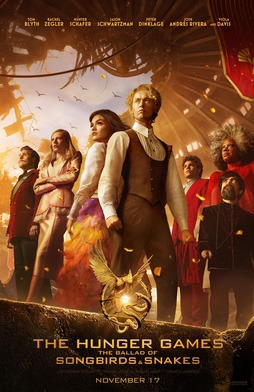“The Social Network” represents generation
It should come as no surprise that a movie about Facebook, about its founding to be exact, was released in theaters this past Friday. At least, not to us college students who have been doing everything in our power to feed the burgeoning ubiquity of Facebook, mostly without the conscious knowledge of doing so.
“The Social Network,” with a screenplay adapted by Aaron Sorkin from the 2009 book “The Accidental Billionaires” and with David Fincher sitting his capable bottom on the director’s chair, is a fantastic film about a “once in a generation only shit idea” as Justin Timberlake’s character bluntly puts it.
Jesse Eisenberg stars as Mark Zuckerberg, the brains behind this “idea,” although a certain pair of identical twins from Harvard’s Porcellian Club might beg to differ, and is joined by a list of young hot Hollywood stars, playing characters that were intrinsic to the story of the founding. “The Social Network” is the cultural mascot of our generation imprinted on film, and it is very engaging and unexpectedly humorous while being so.
The film begins in a dark, crowded and, what I presume to be, sweaty college bar where Mark and Erica (Rooney Mara) are having a rapid conversation about what the former refers to as his motivation but the latter dismisses as an obsession to join one of the elite finals clubs at Harvard. This scene, in its entirety, defines the whole film in that it introduces us to a main character who is so forward thinking, that it is hard to keep up with the different trains of talks he is accused of leading and his unashamed obsession with societal acceptance.
He aspires to cause a stir of some sort around the campus to get recognition from the clubs, but in an upset drunken frenzy ends up creating a website called “facemash” that lets people choose the hotter of two female undergraduate students continuously. His creation yields him several unwanted repercussions but also a swift encounter with the Winklevoss twins and Divya Narendra, then Harvard seniors, who plant the seed of online social interaction in his head. The seed germinates into what we now know of as Facebook.
The film deals a lot with the topic of betrayal and what it means to be on either side of such a predicament. One such situation is explored through the idea of intellectual property theft. While the Winklevoss twins and Narendra are simply outraged by Mark’s actions, Mark is unflinching in his belief that he neither wronged them nor took anything that they had the capacity to achieve. This brings the issue and importance of ethics up, and you ask yourself, who is in the wrong here?
It is really easy to point all fingers at Mark given his deception and his somewhat repugnant personality, courtesy of the flaming arrogance he walks around with inside his chest, but his precocious computing genius makes it hard not to, at the very least, admire him. He claims the three of them could have done nothing appeasable with what he took, and you absolutely believe him, you even cheer for him internally, although if asked about the subject, you do not admit the truth. In your defense, hacking comes to Mark like gags about Sarah Palin come to the writers of Saturday Night Live.
But as Facebook starts expanding and his relationship with his best friend/business partner Eduardo Saverin (Andrew Garfield) starts souring over growing differences in interest for Facebook’s future, it becomes harder and harder to ignore his explicit sense of superiority that he stamps upon everyone. It really makes you wonder if you can get ahead in this age without stomping on the people who had previously helped you get ahead. Mark’s betrayal to his best friend is the most painful to watch, knowing that Eduardo had lost a whole lot more than just a lousy friend, and Garfield does a wonderful job of gradually bringing the sometimes calm, sometimes vehement expostulations out of a character that seemed so inherently compliant in the beginning.
Putting aside the various aftermaths, let’s now focus on the purpose that the creation of Facebook, or anything else substantial enough, was to serve; Getting attention, recognition and acceptance. It is indeed ironic that the creator of what turned out to be such a juggernaut social catalyst was somebody who was only chasing the possible elevation of his social status and nothing else. And he gets there.
Mark gets to 500 million friends and, sure he is the youngest billionaire in the world and all that jazz, but you struggle to see any difference between the Mark angrily guzzling down beer while simultaneously blogging about what a bitch Erica is from the beginning, and the Mark solemnly sitting alone in the law firm’s conference room in the end. Normally, in circumstances like these, you would question the actor and the way he developed the character, but Eisenberg is so far away from being guilty of this colossal crime that you know he had lost more than he had gained from everything he did to make Facebook what it is today. The only reason Mark was as complex as he was, was because of Eisenberg’s efforts, which of course are not obvious at all.
“The Social Network” represents our age and our generation more accurately than any other film, dealing with any other subject matter, could ever dream of. It tells of the instantaneous invasion of the Internet in our lives that the past decade or so has witnessed, whilst interspersing it with the themes of ethics and friendship, among other things. It is a simple film bordering on such an advanced level of complexity that you have to applaud the truly outstanding screenplay by Sorkin, and the sophisticated way in which Fincher attacked its content.
It more than helps that the film is loosely, if not entirely, based on the real story behind the founding of Facebook. “The Social Network” will keep you talking for a long time; it will ask you uncomfortable questions you don’t want anybody to know your answers to, it will frame the form and shape of our generation to be perfectly set against the wall one day, it might even perversely inspire you but most of all it will, to your dismay, make being a billionaire look absolutely sordid.
Photo: Sony Pictures





